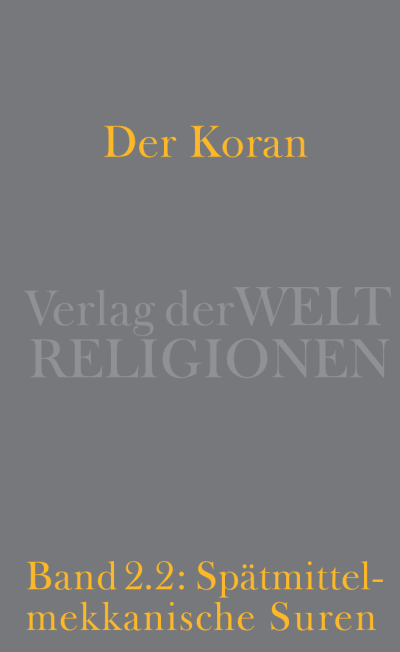The Qur'an: Text and Commentary
Volume 2.2: Suras of the Late Middle Meccan Period. From Mecca to Jerusalem: The Spiritual Journey of the Community out of Secular Indifference and Apocalyptic Pessimism
Annotated with translation by Angelika Neuwirth and Dirk Hartwig
The Qur'an: Text and Commentary / Der Koran
Volume 2.2: Suras of the Late Middle Meccan Period. From Mecca to Jerusalem: The Spiritual Journey of the Community out of Secular Indifference and Apocalyptic Pessimism
Annotated with translation by Angelika Neuwirth and Dirk Hartwig
With the suras of the late middle Meccan period, the Annunciation intervenes in contemporary history, which is shaken by the crisis of the Byzantine defeat against Sassanid Persia in 614. The suras of this period respond critically both to a Christian, messianic doctrine of redemption and to Jewish messianism. Apocalyptic expectations, ubiquitous at the time, are devalued through silence or even trivialised through irony. As a counter-image to the expected messianic ruler, the political ideal...
Read more
With the suras of the late middle Meccan period, the Annunciation intervenes in contemporary history, which is shaken by the crisis of the Byzantine defeat against Sassanid Persia in 614. The suras of this period respond critically both to a Christian, messianic doctrine of redemption and to Jewish messianism. Apocalyptic expectations, ubiquitous at the time, are devalued through silence or even trivialised through irony. As a counter-image to the expected messianic ruler, the political ideal of the ›just ruler‹ is developed – while the pragmatic intention of holding up a mirror to the Byzantine emperor Herakleios shines through.
An increasingly stringent monotheism is reflected in the critical, at times even satirical, treatment of a much-discussed miracle (dormouse), which is corrected to the status of a sign. Liturgically, God’s kingship now gains special weight, whereby his rule also includes the demons, who have now transformed from ›inspiring spirits‹ into threatening forces. They can only be warded off by linguistic means, their own apotropaic formulas (sura 114) or recitation of the Qur'an (surah 72).
The suras of the late middle Meccan period thus prove to be deeply rooted in social and political reality and thus call for a new methodological approach, with primary attention to the ›embeddedness in life‹ of the Qur’anic statements.
An increasingly stringent monotheism is reflected in the critical, at times even satirical, treatment of a much-discussed miracle (dormouse), which is corrected to the status of a sign. Liturgically, God’s kingship now gains special weight, whereby his rule also includes the demons, who have now transformed from ›inspiring spirits‹ into threatening forces. They can only be warded off by linguistic means, their own apotropaic formulas (sura 114) or recitation of the Qur'an (surah 72).
The suras of the late middle Meccan period thus prove to be deeply rooted in social and political reality and thus call for a new methodological approach, with primary attention to the ›embeddedness in life‹ of the Qur’anic statements.
2021, 956 pages
OTHER PUBLICATIONS
Latest first

Year of Publication: 2010
Angelika NeuwirthYear of Publication: 2010
The Qur'an and Late Antiquity
Is the Qur'an a purely Islamic text and therefore foreign to predominantly Christian and Jewish cultures? Or rather, is it a new and wilful voice in the chorus of debates on Late...
Rights sold to:
English world rights (Oxford UP), Arabic world rights (Red Sea Bookstores)
